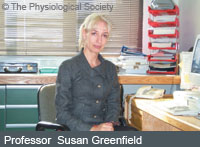'Real progress will be when young women choose not to give up on science'
When one considers women in science, very few have reached the heights achieved by Susan Greenfield - director of the Royal Institution of Great Britain, Fullerian professor of physiology at Oxford, Baroness, and recipient of the French Legion d'Honneur. Which is, of course, precisely the problem. While the EU and its Member States understand better than ever the need to attract and retain women in science careers, particularly when it is estimated that Europe needs at least an extra 600,000 researchers to meet its competitiveness goals, the fact is that they remain acutely under-represented, accounting for between 17 and 35 per cent of the researchers' population depending on the sector of activity. In 2002, Professor Greenfield was asked by Patricia Hewitt, then UK Minister for Trade and Industry, to write a report on women in science, outlining the difficulties that they face and suggesting practical steps to address them. The final document called for a more integrated approach to the issue, with the 70 or so UK initiatives for women in science being brought together within a single 'working science centre', and more public funding and support for measures at the level of individuals, organisations and policies More than three years on from the publication of her report, CORDIS News asked Professor Greenfield whether she has witnessed much progress towards implementing its recommendations. 'To be brutally honest, I haven't seen as much progress as I would have liked,' she replied. She welcomes the establishment by the government of the UK resource centre for women in science, engineering and technology (UKRC), and also recognises the efforts being made by companies such as L'Oréal, which has created a bursary scheme for women returning to science careers following a career break. 'It's important to give credit to the private sector where it's due, but overall we haven't seen much real progress,' she continued, adding that a young woman scientist contemplating having a family now still faces the prospect of seriously damaging or even sacrificing her career. Just as the nature of the problem hasn't changed greatly in the last few years, neither has the solution. 'Our priority must still be to level the playing field for men and women, rather than try to favour women. Positive discrimination doesn't help anyone,' Professor Greenfield believes. A far more effective tool, she says, is the availability of effective mentors for women at the start of their science careers. Professor Greenfield defines a mentor as 'somebody who believes in you more than you believe in yourself', and she has previously highlighted the positive impact that having her own mentor, Jane Mellanby, had during her early career at Oxford. 'Just to have someone to be there for you, who cares about you, and who you can sometimes be insecure with is very important, and particularly so I feel for women in science. More thought needs to be given to how we can coach and mentor people effectively,' she said. Professor Greenfield believes that effective mentoring could encourage more women to push for the top science jobs. 'Why aren't more women applying for senior roles? Partly it's their own fault, and due to a lack of confidence. It's a sweeping generalisation I know, but rather than focussing on their strengths as men often seem to be able to do, women spend more time apologising for what they see as their weaknesses.' At a time when Europe is crying out for more science and technology practitioners, Professor Greenfield describes it as a 'tragedy' and 'a disaster' that solutions have still not been found to staunch the haemorrhage affecting half of the total pool of talent. She is clear where these solutions will have to originate from, however: 'Government action is the only thing that can translate into the wider results that are needed. Other actions and initiatives are important, but they cannot do the job on their own,' believes the professor. While she admits that she is not fully aware of what is being done at EU level to address the issue of women in science, Professor Greenfield says she has seen no evidence of results trickling down to UK grassroots. However, having called for a greater integration of actions and initiatives to promote women in science in her 2002 report, she would perhaps approve of a new EU funded initiative to bring together the many existing organisations and networks in Europe under a single European Platform of Women Scientists (EPWS). But how will we know when real progress is being made, CORDIS News asked Professor Greenfield. 'When young women choose not to give up on science - that's the goal.'
Countries
United Kingdom



